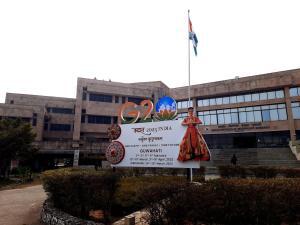Global Affairs September 14, 2023 by
Hasan Sevilir Aşan
G20 Summit without Putin and Jinping
The 20 biggest economic powers that manage the global economy met at the G20 Leaders’ Summit held in New Delhi on September 9-10 and ended with a comprehensive final declaration.
G20
India, which took over the presidency from Indonesia at the Bali Leaders Summit last year with the main theme of “One Earth, One Family, One Future,” handed over the presidency to another G20 troika member, Brazil.
The final declaration contains the issues agreed upon at the numerous meetings held throughout the year under the Indian presidency. The 34-page, 83-article Declaration includes findings and recommendations under headings such as global economy, finance, environment, climate, stability, nuclear security, corruption, hunger, energy, women, health, crypto money, and grain corridor.

*Before the summit, many members wanted the Russia-Ukraine war not to overshadow other global agendas. In a way, it happened that a moderate language was formulated by falling behind the Bali Summit paragraph on Ukraine.
The Ukrainians in the group were not satisfied with the paragraph, while Russia expressed its satisfaction.
The situation also brought to mind that a pre-bargaining could have been made in exchange for Putin not attending the summit voluntarily, softening the Ukraine paragraph in favor of Russia.
*Another development at the Summit was that the African Union, representing 55 countries, is now included in the G20 format as a permanent member. African membership will complete a major geographical deficiency.
*It was seen that the groupings within G20 became more visible at the summit.
G7, BRICS, MIKTA, ASEAN and African Union structures tightened their ranks, and the presence of new competitive groups was felt.
*An agreement was announced to be signed between the US, EU, India, and Saudi Arabia on an ‘’Economic Transportation Corridor from India to the Middle East and Europe’’ similar to China’s ‘’Belt and Road’’ project, whose content is not yet fully understood.
LEADERS
In addition to Spain, which could not come due to COVID-19, Russian and Chinese leaders did not attend the summit. It was especially noteworthy that Putin and Jinping did not give any excuse.
As it will be remembered, last year, under the atmosphere of global political polarization created by Russia’s occupation of Ukraine, G7 Leaders had implied that they could boycott the Bali Summit if Putin attended. Following some diplomatic efforts, Putin could not come and Russia was represented by Foreign Minister Lavrov at the summit.
Meanwhile, US President Biden had also mentioned the possibility of Putin being arrested in accordance with International Criminal Court decisions if he comes.
This concern puts Putin’s travels outside Russia always at risk.
No official statement was made for Xi Jinping either. This situation reminded of the ongoing Himalayan border dispute and map conflicts between China and India.
The absence of the two most powerful leaders of the East in G20 undoubtedly lowered the leader’s profile while reducing the summit excitement, too.
The intensity of G7-BRICS competition in G20 is expected to take shape at meetings throughout the year under Brazil’s new term presidency.
Although Russia and China see G20 more as a forum dominated by Westerners, they also attach special importance to representation by seeing that there is no other forum that brings East and West together.
BRICS
It is known that BRICS was structured to break Western hegemony and G7’s global dominance.
For now, BRICS, which combines the economic powers of Brazil, Russia, India, China, and South Africa, announced that Iran, Saudi Arabia, United Arab Emirates, Egypt, Argentina and Ethiopia were invited to the group for expansion. With new participating countries, the number of BRICS members will increase to 11 next year. It is also reported that more than 40 countries are interested in and 22 of them have already applied for membership.
Therefore, it would not be wrong to say that the global competition in the new Cold War era will take place between the G7 and BRICS fronts.